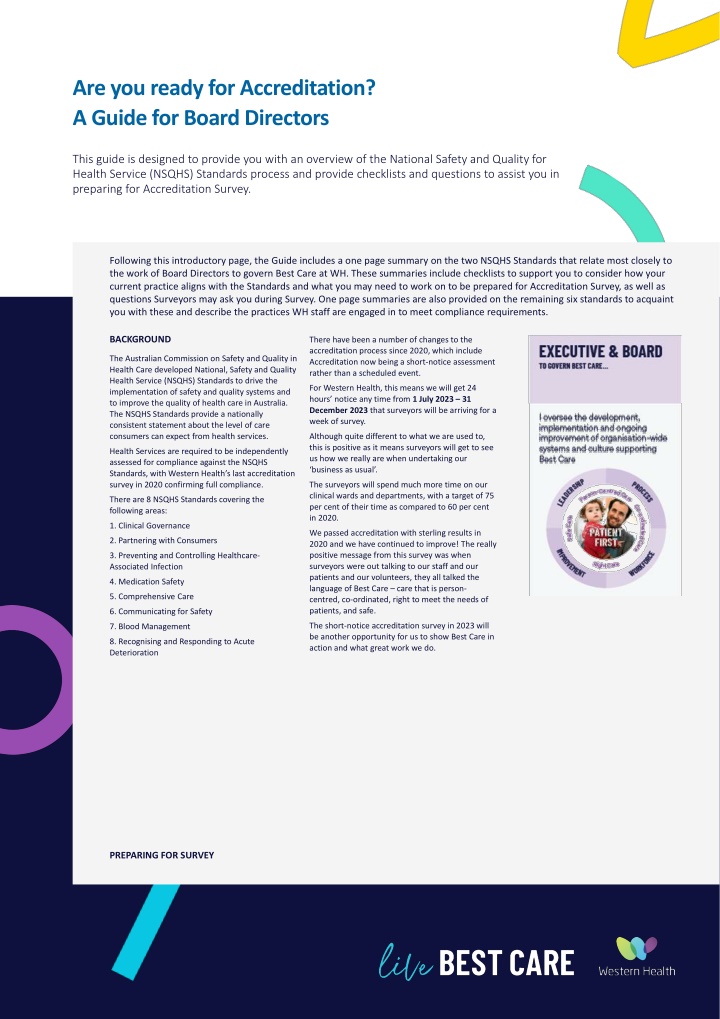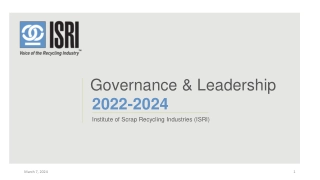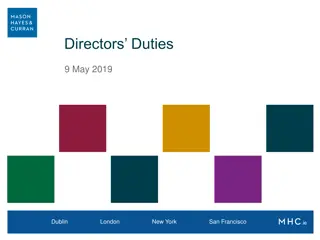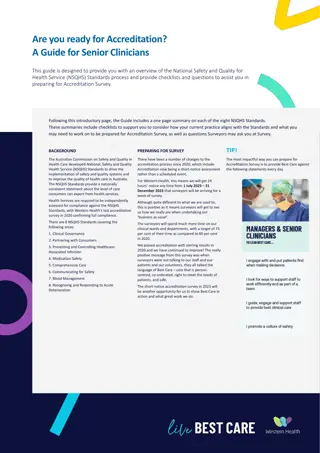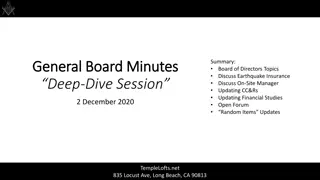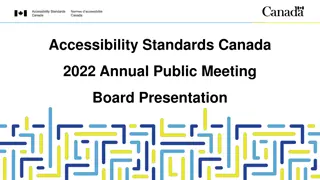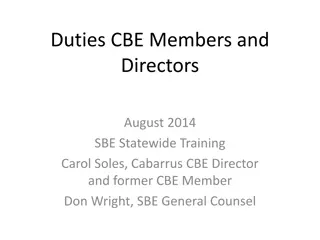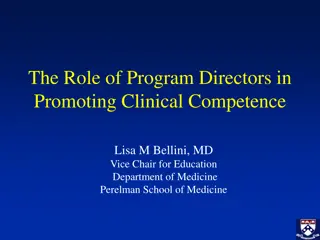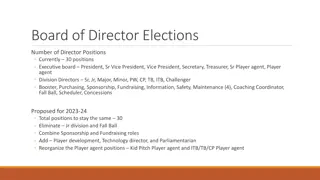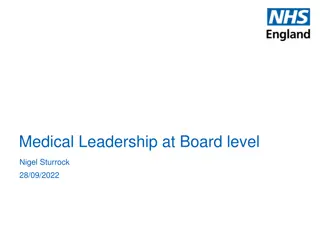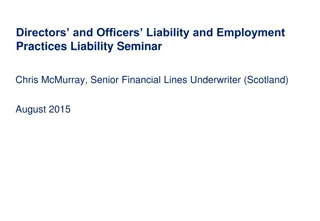Guide for Board Directors on NSQHS Standards Process
This guide provides an overview of the National Safety and Quality for Health Service (NSQHS) Standards process for Board Directors to prepare for Accreditation Survey. It includes checklists, questions, and summaries of the standards, emphasizing the importance of aligning current practices with the Standards. The guide outlines the changes to the accreditation process, the focus areas of the NSQHS Standards, and the requirements for compliance. Board Directors are encouraged to familiarize themselves with the Clinical Governance Standard and prepare for questions related to supporting Best Care at Western Health.
Download Presentation

Please find below an Image/Link to download the presentation.
The content on the website is provided AS IS for your information and personal use only. It may not be sold, licensed, or shared on other websites without obtaining consent from the author.If you encounter any issues during the download, it is possible that the publisher has removed the file from their server.
You are allowed to download the files provided on this website for personal or commercial use, subject to the condition that they are used lawfully. All files are the property of their respective owners.
The content on the website is provided AS IS for your information and personal use only. It may not be sold, licensed, or shared on other websites without obtaining consent from the author.
E N D
Presentation Transcript
Are you ready for Accreditation? A Guide for Board Directors This guide is designed to provide you with an overview of the National Safety and Quality for Health Service (NSQHS) Standards process and provide checklists and questions to assist you in preparing for Accreditation Survey. Following this introductory page, the Guide includes a one page summary on the two NSQHS Standards that relate most closely to the work of Board Directors to govern Best Care at WH. These summaries include checklists to support you to consider how your current practice aligns with the Standards and what you may need to work on to be prepared for Accreditation Survey, as well as questions Surveyors may ask you during Survey. One page summaries are also provided on the remaining six standards to acquaint you with these and describe the practices WH staff are engaged in to meet compliance requirements. BACKGROUND There have been a number of changes to the accreditation process since 2020, which include Accreditation now being a short-notice assessment rather than a scheduled event. The Australian Commission on Safety and Quality in Health Care developed National, Safety and Quality Health Service (NSQHS) Standards to drive the implementation of safety and quality systems and to improve the quality of health care in Australia. The NSQHS Standards provide a nationally consistent statement about the level of care consumers can expect from health services. For Western Health, this means we will get 24 hours notice any time from 1 July 2023 31 December 2023 that surveyors will be arriving for a week of survey. Although quite different to what we are used to, this is positive as it means surveyors will get to see us how we really are when undertaking our business as usual . Health Services are required to be independently assessed for compliance against the NSQHS Standards, with Western Health s last accreditation survey in 2020 confirming full compliance. The surveyors will spend much more time on our clinical wards and departments, with a target of 75 per cent of their time as compared to 60 per cent in 2020. There are 8 NSQHS Standards covering the following areas: 1. Clinical Governance We passed accreditation with sterling results in 2020 and we have continued to improve! The really positive message from this survey was when surveyors were out talking to our staff and our patients and our volunteers, they all talked the language of Best Care care that is person- centred, co-ordinated, right to meet the needs of patients, and safe. 2. Partnering with Consumers 3. Preventing and Controlling Healthcare- Associated Infection 4. Medication Safety 5. Comprehensive Care 6. Communicating for Safety The short-notice accreditation survey in 2023 will be another opportunity for us to show Best Care in action and what great work we do. 7. Blood Management 8. Recognising and Responding to Acute Deterioration PREPARING FOR SURVEY
Standard 1: Clinical Governance This standard aims to ensure that there are systems in place within Western Health to maintain and improve the reliability, safety and quality of health care The Clinical Governance Standard supports the Pillars of our Best Care Framework the quality systems that support our staff to lead, drive and create Best Care ACCREDITATION CHECKLIST At Survey, you may be asked questions such as: Being prepared for accreditation survey against the Clinical Governance Standard means that What does Best Care at Western Health mean to you? You are familiar with the content of the WH Strategic plan You can describe WH s approach to Best Care (as outlined in the WH Best Care Framework document) What is the role of the board in support Best Care? You can describe the org-wide governance systems supporting Best Care at WH (as outlined in the NSQHS Standards 1.1 & 1.2 self-assessment submitted to the Board annually to inform board level Attestation against the Standards) How do you know there is a good culture for providing Best Care at Western Health? What Best Care focused reports are routinely submitted to the Board? You promote and model a positive workplace and a culture of providing Best Care What are the current biggest challenges to providing Best Care at WH? You can describe the reports you receive that reflect on a positive workplace and best care culture You are aware of the WH policies aligned with any board sub-c tees you are on and their in-date status Can you describe major strategic projects that are supporting Best Care? You have completed an emergency training questionnaire in the last twelve months and are up- to-date with mandatory vaccinations What are WH s top strategic risks? You consider Best Care in the approval of matters for decision presented at board level You can describe the Best Care focused reports that are reported routinely at Board level eg WH Performance Report, Best Care Report You can describe the biggest challenges to providing Best Care at WH You can give examples of priority actions in the WH Business Plan supporting Best Care You know the risk areas that make up the WH Strategic Risk Profile and the major WH initiatives/projects that are addressing these You participate in the WH Leadership Walkaround Process You engage in WH events that recognise staff and volunteer achievements to provide Best Care You have read the annual Quality Account publication that outlines Best Care and highlights Best Care challenges and achievements
Standard 2: Partnering with Consumers This standard aims to ensure that consumers are partners in the design, delivery and evaluation of healthcare systems and services, and that consumers, carers and/or their family are supported to be partners in their own care. The Partnering with Consumers Standard supports the Pillars of our Best Care Framework the quality systems that support our staff to lead, drive and create Best Care ACCREDITATION CHECKLIST At Survey, you may be asked questions such as: Being prepared for accreditation survey against the Partnering with Consumers Standard means that You can describe WH s approach to Partnering with Consumers (as outlined in the WH Best Care Framework document Patient First ) Why is it important to partner with patients and consumers? What is your role in supporting partnering with consumers? You are aware of organisation-wide systems supporting partnering with consumers What type of governance systems exist to support partnering with consumers? You are aware of WH s diverse community and systems in place to provide culturally appropriate care/services How does WH support the health needs of Aboriginal & Torres Strait Islander people? You are aware of WH strategies to address the needs of Aboriginal & Torres Strait Islander people You are familiar with the content of the WH Strategic plan, particularly relating to communicating with our patients, our partners and each other You are aware of the programs Volunteers support at WH and acknowledge this work You action opportunities to listen to patient stories You can describe board level reports that include feedback from patients
Standard 3: Preventing & Controlling Healthcare-Associated Infection This standard aims to reduce the risk of patients getting preventable healthcare-associated infections, manage infections effectively if they occur, and limit the development of antimicrobial resistance through the appropriate prescribing and use of antimicrobials The Preventing and Controlling Healthcare-Associated Infection Standard supports Western Health to provide Safe Care ACCREDITATION CHECKLIST Being prepared for accreditation survey against the Infection Prevention Standard means that clinical/support staff at the front-line: know where to access Infection Prevention Guidelines on the WH Intranet are up-to-date with mandatory hand hygiene training and aseptic technique training are up-to-date with mandatory vaccinations can describe how they involve patients & visitors in infection prevention follow the infectious diseases screening process required for all patients follow precautions, including 5 moments of hand hygiene follow the procedures for safe insertion, maintenance & removal of invasive medical devices know why, where and how to use Personal Protective Equipment (PPE) know which clinical products are re-usable and the process for cleaning/sterilisation know about WH s Antimicrobial Stewardship Program and engage with this program as required participate in prevention auditing processes as required/requested are made aware of infection rates and hand hygiene results record incidents relating to infection prevention on Riskman and review them in a timely manner know how to raise a concern or risk about infection prevention engage in relevant org-wide and local infection prevention improvement initiatives
Standard 4: Medication Safety This standard aims to ensure that clinicians safely prescribe, dispense and administer appropriate medicines, and monitor medicine use. It also aims to ensure that consumers are informed about medicines, and understand their own medicine needs and risks. The Medication Safety Standard supports Western Health to provide Safe Care ACCREDITATION CHECKLIST Being prepared for accreditation survey against the Medication Safety Standard means that clinical/support staff at the front-line: know where to access policies, procedures and guidelines relating to Medication Management can describe how they involve patients & visitors in medication management ensure patients medication allergies are documented and marked as reviewed on the EMR / patient record ensure that they label injectable medicines, fluids and lines according to national recommendations are using the Medication Administration Wizard (MAW) to support safe use of medications know how to report an adverse drug reaction record incidents relating to medication safety on Riskman and review them in a timely manner store medications securely and safely in their areas participate in medication management auditing processes as required/requested provide access to and discuss medication related incident and audit data know how to raise a concern or risk about medication management engage in relevant org-wide and local medication safety improvement initiatives
Standard 5: Comprehensive Care This standard aims to ensure that consumers receive comprehensive health care that meets their individual needs, and that considers the impact of their health issues on their life and wellbeing. It integrates patient care processes to identify patient needs and prevent harm, and includes actions related to falls, pressure injuries, nutrition, mental health, cognitive impairment and end- of-life care. The Comprehensive Care Standard supports Western Health to provide Person-Centred Care ACCREDITATION CHECKLIST Being prepared for accreditation survey against the Comprehensive Care Standard means that clinical/support staff at the front-line: know where to access the WH Comprehensive Care Policy and related procedures & guidelines have accessed WeLearn packages supporting Comprehensive Care eg delirium, pressure injuries use WH s screening and assessment processes in collaboration with patients and families to develop a goal-directed comprehensive care plan deliver safe care that is based on the patient s comprehensive care plan, and by partnering with patients, carers and families support patients to document clear advance care plans and ensure they deliver comprehensive care to patients at end of life engage with patients & families and use established WH strategies (including devices/equip) for the prevention & care for patients at risk of a pressure injury or fall identify and action patients nutrition and hydration needs follow WH guidelines for caring with patients with cognitive impairment or at risk of developing, or with, delirium know how to identify and respond to patients at risk of self-harm or suicide follow WH processes for identifying and managing the occurrence of patient or visitor aggression understand when, where and how restraint is used within Western Health record incidents relating to comprehensive care on Riskman and review them in a timely manner know how to raise a concern or risk about comprehensive care in your area engage in relevant org-wide and local comprehensive care improvement initiatives
Standard 6: Communicating for Safety This standard aims to ensure that there is effective communication between patients, carers and families, multi-disciplinary teams and clinicians, and across Western Health, to support continuous, co-ordinated and safe care for patients. The Communicating for Safety Standard supports Western Health to provide Co-ordinated Care ACCREDITATION CHECKLIST Being prepared for accreditation survey against the Communicating for Safety Standard means that clinical/support staff at the front-line: know where to access Communicating for Safety related policies, procedures and guidelines (eg clinical handover, patient identification) ensure that patients & families are kept informed at all times through their healthcare journey ensure 3 patient identifiers are used in your area prior to any invasive procedures or treatments follow Time Out procedures where required conduct shift to shift handover use ISBAR to handover patient information and include patients and families in handover if appropriate ensure that transfer processes are adhered to whenever a patient is transferred between wards, departments and sites including a verbal handover ensure that patients are discharged with a summary of care provided to them ensure that services that are required post discharge are planned and co-ordinated with the relevant health service professional and the patient and family promote collaboration and a shared understanding between health professionals and the patient for care in their area record incidents relating to communicating for safety on Riskman and review them in a timely manner know how to raise a concern or risk about communicating for safety engage in relevant org-wide and local communicating for safety improvement initiatives
Standard 7: Blood Management This standard aims to ensure that patients own blood is safely and appropriately managed, and that any blood and blood products that patients receive are safe and appropriate. The Blood Management Standard supports Western Health to provide Right Care ACCREDITATION CHECKLIST Being prepared for accreditation survey against the Blood Management Standard means that clinical/support staff at the front-line: know where to access blood management policies, procedures and guidelines are aware of the safe and appropriate use of blood and blood products are up-to-date with mandatory blood management training know where to source information for patients and their families around blood management can describe how consent is obtained and documented for patients for blood / blood products know what to do if a patient/guardian refuses a blood transfusion know what to do if a patient has a reaction to blood or a blood product know the process for reporting a patient reaction to blood or a blood product know where and how blood and blood products are stored record incidents relating to blood management on Riskman and review them in a timely manner know how to raise a concern or risk about blood management engage in relevant org-wide and local blood management improvement initiatives
Standard 8: Recognising & Responding to Acute Deterioration This standard aims to ensure that acute deterioration in a patient s physical, mental or cognitive condition is recognised promptly and appropriate action is taken. The Recognising & Responding to Acute Deterioration Standard supports Western Health to provide Safe Care ACCREDITATION CHECKLIST Being prepared for accreditation survey against the Acute Deterioration Standard means that clinical/support staff at the front-line: know where to access deteriorating patient related Policy, Procedure and Guidelines on the WH Intranet have undertaken deteriorating patient related training within the past 12 months (BLS/ALS as a minimum) know how to recognise acute clinical deterioration know what, when and how to respond to acute clinical deterioration know their responsibilities in a MET call / code blue situation ensure that patients in their area know about Call for Help and know what to do when it is actioned record incidents relating to the deteriorating patients on Riskman and review them in a timely manner know how to raise a concern or risk about recognising & responding to acute deterioration engage in relevant org-wide and local deteriorating patient improvement initiatives
